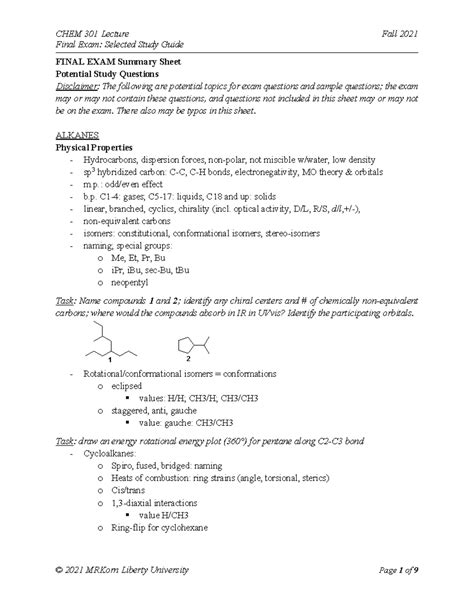Prepare yourself for academic triumph with our comprehensive guide to the American Chemical Society (ACS) Chemistry Final Exam. As a student of chemistry, this exam holds immense significance as it not only tests your understanding of fundamental chemical principles but also assesses your readiness for advanced studies or a career in the field.

Overview
The ACS Chemistry Final Exam is a standardized exam administered nationwide to undergraduate chemistry students. It comprises 70 multiple-choice questions, each worth one point, covering a wide range of topics in general chemistry. These topics include:
- Atomic structure and properties
- Molecular structure and bonding
- States of matter
- Solutions and colligative properties
- Chemical reactions and stoichiometry
- Equilibrium and thermodynamics
- Acids and bases
- Redox reactions
- Organic chemistry
The exam is typically administered in a timed environment, allotting three hours for completion. Students are advised to pace themselves effectively and allocate appropriate time to each section.
Preparation Strategies
Conquering the ACS Chemistry Final Exam requires a strategic and dedicated approach. Consider the following preparation tips to maximize your chances of success:
-
Review Course Material Thoroughly: Begin by revisiting your lecture notes, textbooks, and other class materials to refresh your understanding of the concepts. Focus on identifying areas where you need additional reinforcement.
-
Practice with Past Exams: Obtain copies of past ACS Chemistry Final Exams and practice solving them under timed conditions. This will help you familiarize yourself with the exam format, question types, and time constraints.
-
Study with a Study Group: Joining a study group with fellow students can provide a valuable platform for discussion, clarification of concepts, and collaborative problem-solving.
-
Seek Help from Instructors and TAs: Do not hesitate to reach out to your professors, teaching assistants, or peers for guidance and support when encountering challenging topics.
-
Manage Time Effectively: Time management is crucial during the exam. Practice allocating time to each section based on its difficulty and importance.
Key Concepts
A thorough understanding of key concepts is essential for success on the ACS Chemistry Final Exam. Familiarize yourself with the following vital areas:
-
Atomic Structure and Bonding: Comprehend the structure of atoms, their electronic configurations, and the various types of chemical bonds.
-
Chemical Reactions and Stoichiometry: Master balancing chemical equations, predicting reaction products, and calculating reactant and product quantities.
-
Equilibrium and Thermodynamics: Understand the concepts of chemical equilibrium, Le Chatelier’s principle, and the laws of thermodynamics.
-
Organic Chemistry: Gain an understanding of the structure, bonding, and reactivity of organic molecules, including functional groups and organic reactions.
Test-Taking Strategies
Maximize your performance on the ACS Chemistry Final Exam by employing effective test-taking strategies:
-
Read Instructions Carefully: Before starting the exam, read the instructions thoroughly and ensure you understand the format and any specific requirements.
-
Pace Yourself: Begin by answering the easier questions to build confidence and momentum. Subsequently, allocate more time to more challenging questions.
-
Guess Wisely: If you are unsure about an answer, make an educated guess rather than leaving it blank. Eliminate any options you know are incorrect to increase your chances of selecting the correct answer.
-
Check Your Work: If time permits, review your answers before submitting the exam. Identify any errors or inconsistencies and make corrections as necessary.
Applications of Chemistry
Chemistry is an integral discipline with vast applications across numerous fields. Understanding the principles of chemistry opens up a world of opportunities, including:
-
Materials Science: Advancements in materials science rely on the understanding of chemical bonding and the properties of materials.
-
Biochemistry: Chemistry plays a pivotal role in studying biological processes and developing new pharmaceuticals.
-
Environmental Science: Chemical principles are essential for addressing environmental challenges, such as pollution control and sustainable energy.
-
Nanotechnology: Chemistry empowers the development and application of nanoscale materials with unique properties.
Customer Testimonials
Students who have successfully navigated the ACS Chemistry Final Exam share their experiences:
“The practice exams and study group were invaluable. They gave me the confidence to tackle the exam with ease,” said Emily, a recent chemistry graduate.
“I found the exam challenging but fair. Understanding the key concepts and utilizing effective test-taking strategies was crucial,” shared John, a current chemistry undergraduate.
Conclusion
Conquering the ACS Chemistry Final Exam is an achievable goal with the right preparation and mindset. By implementing the strategies outlined in this guide, you can maximize your understanding of chemical principles, hone your problem-solving skills, and achieve academic success. Remember, the ACS Chemistry Final Exam is not just an assessment of your knowledge; it is a testament to your dedication, perseverance, and passion for chemistry. Embrace the challenge and strive for excellence!
Tables
| Topic | Number of Questions |
|—|—|—|
| Atomic Structure and Bonding | 10 |
| Molecular Structure and Bonding | 12 |
| States of Matter | 8 |
| Solutions and Colligative Properties | 9 |
| Chemical Reactions and Stoichiometry | 10 |
| Equilibrium and Thermodynamics | 11 |
| Acids and Bases | 6 |
| Redox Reactions | 4 |
| Organic Chemistry | 10 |
| Difficulty Level | Percentage of Questions |
|—|—|—|
| Easy | 30% |
| Medium | 50% |
| Hard | 20% |
| Time Allocation | Recommended Minutes |
|—|—|—|
| Atomic Structure and Bonding | 25 |
| Molecular Structure and Bonding | 30 |
| States of Matter | 20 |
| Solutions and Colligative Properties | 25 |
| Chemical Reactions and Stoichiometry | 30 |
| Equilibrium and Thermodynamics | 35 |
| Acids and Bases | 15 |
| Redox Reactions | 10 |
| Organic Chemistry | 30 |
